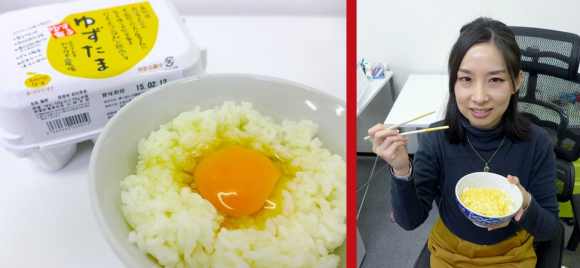
In a lot of ways, eggs are a pretty wonderful food. Cheap and versatile, they’re just about the quickest and easiest route to a hot, filling meal that’s high in protein and low in calories.
But while eggs may taste great, they don’t quite measure up to the standards set by other breakfast staples in the aroma department, such as sizzling bacon or freshly sliced grapefruit. Unless, of course, you’ve got your hands on some of these special eggs from Kochi Prefecture that smell, and taste, like yuzu, one of Japan’s most delicious citrus fruits. And yes, the scent is all natural.
We recently picked up a pack of yuzu tama (short for “yuzu tamago” or “yuzu eggs”), and were anxious to see how they taste. We could have tossed one in a bowl of ramen or used it to top a pork cutlet bowl, but for our first time we wanted to experience the yuzu tama’s flavor with as little distraction as possible, so we settled on whipping up some tamago-kake gohan.
▼ The yuzu tama package
Just about the simplest dish in all of Japanese cuisine, tamago-kake gohan literally means “rice with egg poured over it,” and that’s really all it is. Dish up a bowl of white rice, crack a raw egg over it, maybe add a little soy sauce, mix it all together, and congratulations, you’ve just made one of Japan’s favorite comfort foods.
Even though they’ve got a pleasing brown color, the yuzu tama don’t look any different from normal eggs, but they certainly smell different. Opening the package brought a tantalizing yuzu scent to our nose, even before we broke the shell.
▼ Finding an egg with a good smell is like discovering a brand of shampoo that plays your favorite song as you wash your hair: Entirely unexpected and unmistakably cool.
Cracking one of the eggs open releases more of the yuzu aroma, enough that you might be wondering if there’re any added scents or perfumes. Rest easy, though, as the yuzu tama have no such chemical additives. Instead, their special feature is a result of the diet of the hens that lay them.
Kochi makes up the southwest corner of the island of Shikoku, and the prefecture is famous for its yuzu orchards. More flavorful than orange yet sweeter than grapefruit, yuzu gets used as a seasoning for all sorts of dishes, and can also be used to make delicious juice or liqueur. At Yamasaki Farms, though, the chicken feed contains yuzu peels (or “zests,” if you want to use the same term as recipes for orange and lemon cakes). The yuzu peel then imparts its aroma, as well as some of its flavor, to the eggs the birds produce.
With our olfactory senses and appetite thoroughly stimulated, we dished up a bowl of piping hot rice and crowned it with the yuzu tama.
▼ Mixing: The most difficult step of making tamago-kake gohan (which is still incredibly simple)
▼ All set!
Since she’s the biggest tamago-kake gohan fan in the office, we let our Japanese-language correspondent Meg have the honor of the first bite…
…and she was not disappointed. In her own words:
“Oh, wow! The yolk has a mellow flavor, and the white has a great texture, not too soft and not too firm. And when you chew, there’s this invigorating wave of yuzu aroma coupled with a refreshing citrus taste that spreads through your mouth. I’ve never had an egg like this before!”
▼ First bite good, second bite even better!
For some of you, the idea of citrus-flavored eggs may have you imagining an invasive, acidic quality. Don’t worry though, there’s nothing like that going on here. The yuzu flavor isn’t as powerful as the scent, and if anything it helps to draw out more of the egg’s inherent rich sweetness.
It’s common to add a dash of soy sauce to tamago-kake gohan, but we’d recommend passing on the condiment here, as it’s got its own smell that would sadly mask some of the yuzu’s. Instead, if you’re craving a little something extra, we recommend just a bit of salt.
Thankfully, you don’t have to go all the way to Kochi to purchase yuzu tama. In Tokyo, they’re available at Marugoto Kochi, a shop in the Ginza neighborhood that’s stocked with all sorts of goodies from the prefecture (sort of like the Yamaguchi specialty shop where we bought the sake from Evangelion and canned blowfish).
A pack of six goes for 494 yen (US $4.20), which we admit is a little expensive for eggs. Thinking of it from a different perspective, though, the price seems reasonable for “the only eggs in the world that smell and taste like yuzu.”
▼ And an absolute bargain for “the best eggs Meg’s ever eaten.”
And by the way, if you’re not down with the idea of eating raw egg (even if the heat from the rice cooks it a little), the yuzu tama also fry up just fine, while still retaining all of their special scent and flavor.
▼ And we promise not to tell Meg.
Shop information
Marugoto Kochi / まるごと高知
Address: Tokyo-to, Chuo-ku, Ginza 1-3-13, Ripurekusu Tower
東京都中央区銀座1-3-13 リープレックス銀座タワー
Open 10:30 a.m.-8 p.m.
Website
Related: Yamasaki Farms
Photos: RocketNews24
[ Read in Japanese ]